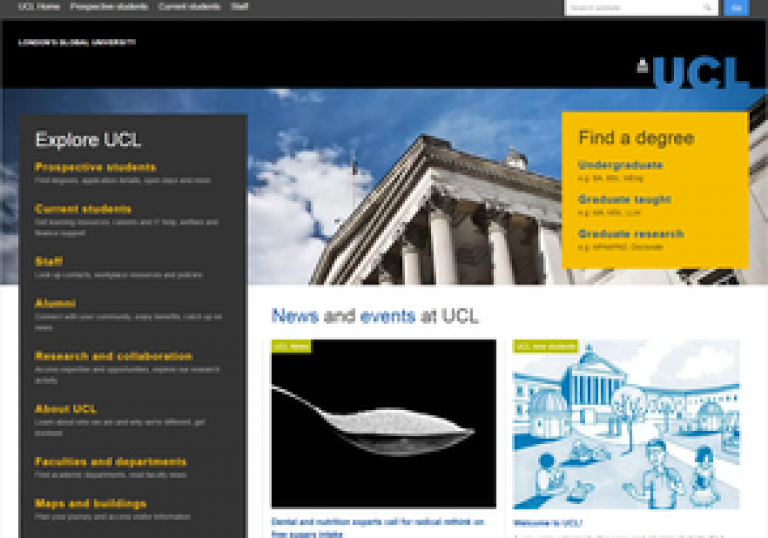Improving the UCL web presence
24 September 2014
In line with our status as a world-leading university, UCL must have a world-leading web presence.
 This is the first point
of contact with UCL for many prospective students, research partners, future
staff and the media (to name just a few). So it's vital that we provide those
users with an online experience of UCL that reflects the outstanding qualities of
UCL in terms of academic excellence, ground-breaking research and amazing
facilities. That way they will want to apply to be a student or a member of
staff, to fund research, or work with UCL which, in turn, will help to build
and enhance UCL as an institution.
This is the first point
of contact with UCL for many prospective students, research partners, future
staff and the media (to name just a few). So it's vital that we provide those
users with an online experience of UCL that reflects the outstanding qualities of
UCL in terms of academic excellence, ground-breaking research and amazing
facilities. That way they will want to apply to be a student or a member of
staff, to fund research, or work with UCL which, in turn, will help to build
and enhance UCL as an institution.
Recent research on 'Digital at the heart of UCL', carried out by digital agency Precedent, found that UCL's current web presence gives the:
'impression of a disconnected organisation - thus having a potentially harmful effect on UCL's reputation'.
Also, when comparing UCL's web presence with that of leading competitors, the report showed that:
'competitors are doing significantly more with their web presence' and 'clearly understand the value in communicating a strong unified presence and … a coherent experience across the whole site'.
What are the strategic objectives for web?
The users should be at the heart of any web strategy as the reactions and behaviour of users are what contribute to the success or failure of a website. For example, once they'd visited the site, did the prospective student find the relevant programme information and then apply? Did the potential research collaborator find out who is carrying out research of interest to them and then make contact? Was the donor convinced by what they read so they completed the online giving form?
The vision for web is therefore:
As the users' experience of UCL's web presence reinforces and shapes their perceptions of UCL, the total presence will consistently reflect the excellence and distinctiveness of UCL.
To deliver on this vision and seek to address the factors that currently reduce the effectiveness and impact of the UCL web presence, the three-year web strategy has the following objectives:
- Promoting and governing the web at UCL
- Mobile first - anytime, anywhere, device-independence
- Optimising the user experience and design of UCL's websites and applications and enabling good communication
- Raising the quality of web content and enabling the consumption of data
- Providing a cutting edge design and development environment
- Enabling optimal performance, scalability and reliability for UCL's web presence
- Enabling the most efficient student recruitment process
- Supporting Research Strategy aims (leadership, cross-disciplinarity, impact)
What governance is in place?
The Web Services Strategy Group has the remit 'to propose, champion and monitor the development and implementation of the UCL Web Strategy including digital communications'. The Group has cross-UCL representation, is chaired by Rex Knight, Vice Provost Operations, and reports to the Information Services Governance Committee.
[http://www.ucl.ac.uk/srs/governance-and-committees/committees/isgc]
[https://www.ucl.ac.uk/isd/community/govern/web-services]
To provide input to the WSSG, the web governance structure has a number of user and advisory groups covering student and staff web information, technology & standardisation and digital communications. These groups advise on the various aspects of web at UCL so that the WSSG receives a rounded, and grounded, view of the web from a broad range of cross-section of UCL.
What does this mean in practical terms?
The Web Services Strategy Group is also in place 'to determine which projects are included in the Web Services domain's project portfolio for the forthcoming year'. The Web Services domain is one of five domains that have project funding allocated to them by the Information Services Governance Committee. (The others are: learning & teaching; infrastructure; research information & IT; and administrative information.) So, in other words, the WSSG determines how project funding will be allocated to meet the objectives of the web strategy.
During 2014/15, the focus will be on:
- Selecting and implementing a new Content Management System (CMS)
- Redeveloping the prospective students' website and the associated database technology.
If you would like to know more about the strategy or discuss your part of the UCL web presence, please contact Susan Farrell, Head of Web & Mobile Services; s.farrell@ucl.ac.uk.
Susan Farrell, Head of Web & Mobile Services, Information Services Division
 Close
Close

